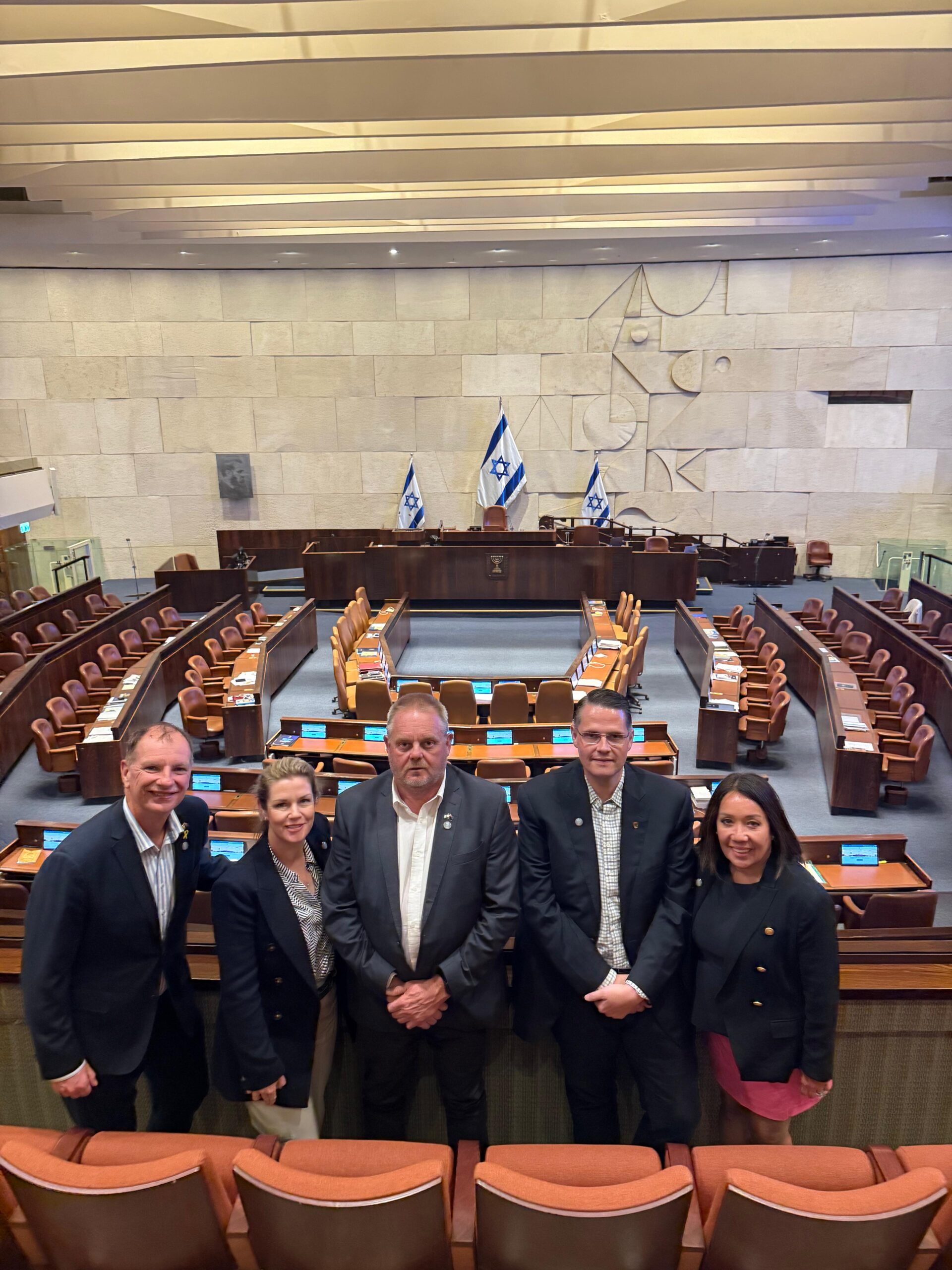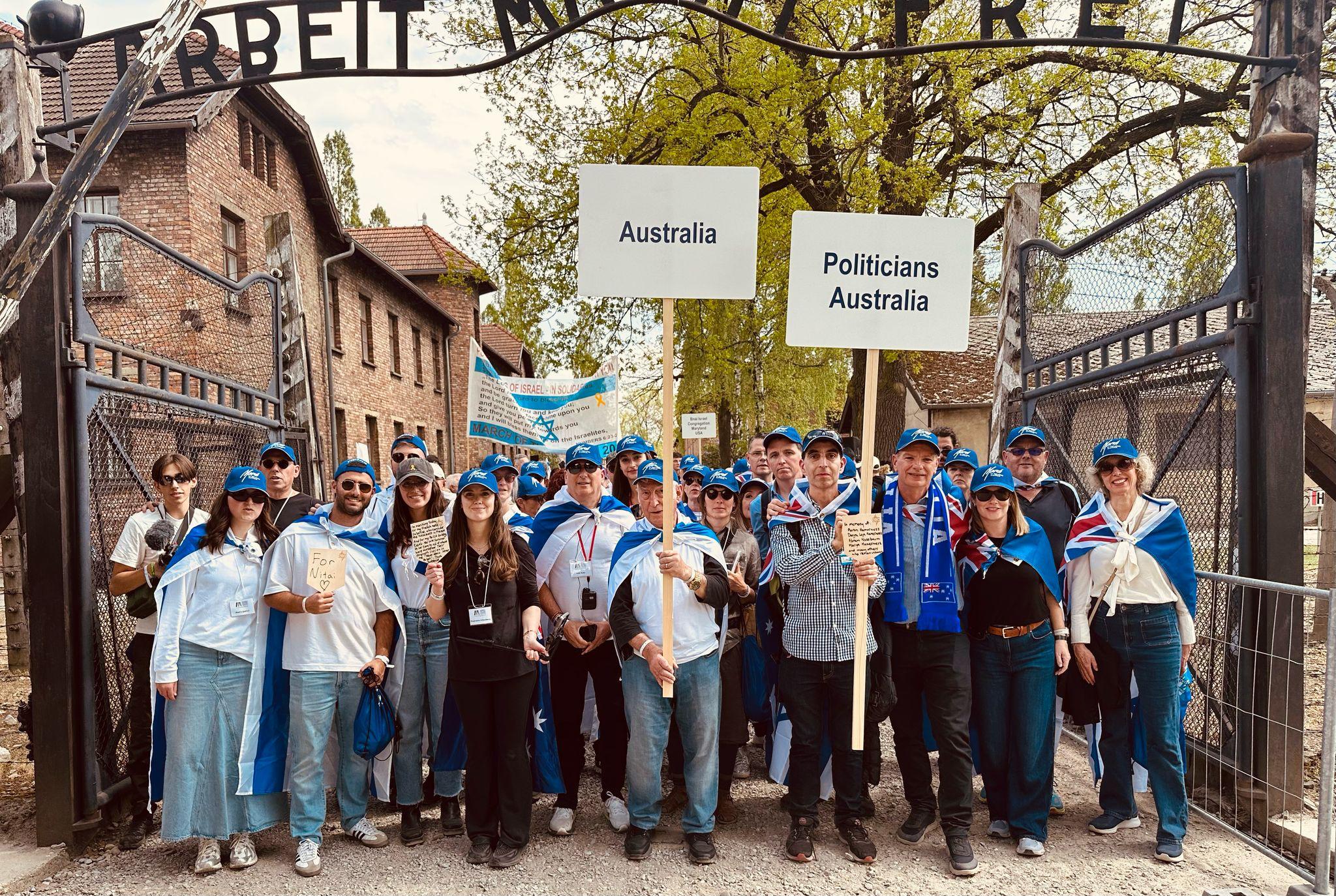After 18 months of rising antisemitism across Australia and a federal government under the Labor Party struggling to curtail it, Prime Minister Anthony Albanese was re-elected in a landslide victory over the weekend.
Peter Dutton, leader of the Liberal-National Coalition, has conceded defeat.
In Australia, the Liberal and National parties are considered more conservative, while the Labor and Greens parties are viewed as more progressive.
The election news followed closely behind a visit to Israel by a delegation of conservative Australian state parliamentarians. The group first attended the March of the Living in Poland, then traveled to Israel to witness sites connected to the October 7 Hamas massacre, as well as Yad Vashem, Israel’s northern border, and other strategic locations impacted by the war. They departed on Israeli Independence Day.
For some, it was their first visit to Israel; others had been before. Jewish parliamentarian David Southwick—member for Caulfield in the Victorian Legislative Assembly and the convener of the mission—said it was his sixth trip as an MP since 2010.
“It’s about bringing them here so they can see, understand, and ultimately provide advocacy and support for Israel going forward,” Southwick told The Media Line. “So it’s been a really important program, and it’s certainly changed the perspective in terms of advocacy.”

(Australian Mission)
The decision to take the trip came amid a sharp rise in antisemitism across the country. According to a report released last week by Tel Aviv University’s Center for the Study of Contemporary European Jewry and the Irwin Cotler Institute for Democracy, Human Rights and Justice, Australia and Italy experienced the most significant spikes in antisemitism globally.
Australia saw a threefold increase in antisemitic incidents between 2022 and 2024. In an interview with local media, Dr. Carl Yonker, who helped prepare the report, said, “In Australia, there were outside actors perhaps driving the rise in antisemitic incidents or promoting acts of vandalism and violence and harassment in the community. Those are still under investigation.”
With around 120,000 Jews living in Australia, according to the Jewish Communal Appeal’s most recent census, several parliamentarians said they felt a duty to understand what was happening in Israel and bring a clear message back to their communities.
James Newbury, member of parliament for Brighton, Shadow Treasurer, and Shadow Minister for Equality, visited Israel a few months after the war began. He said he wanted to witness the situation firsthand and “make sure we keep social cohesion together.”
“I could feel in my own country that social cohesion was starting to split,” Newbury told The Media Line. “We’d seen some horrible incidents of antisemitism. So I took the opportunity with a couple of my colleagues to come.”
The trip followed an October 9 rally held on the steps of the Sydney Opera House, during which Jewish Australians were reportedly discouraged from attending due to safety concerns. Allegations later surfaced that some attendees shouted, “Gas the Jews.”
Newbury toured several kibbutzim and the Nova Music Festival massacre site during his visit. He said, “There has been a massive spike [in antisemitism] and a weakness in our government, which has not stood strongly enough against the breakdown of social cohesion in general and, more specifically, antisemitism.”
This holiday season, give to:
Truth and understanding
The Media Line's intrepid correspondents are in Israel, Gaza, Lebanon, Syria and Pakistan providing first-person reporting.
They all said they cover it.
We see it.
We report with just one agenda: the truth.


Newbury warned that Australia’s long-standing reputation as one of the world’s most multicultural countries is at risk.
“And the sad thing is, once there’s a turn on the Jews, who’s next? It can be anybody,” he said.
While Newbury was shaken by what he saw during the previous trip, this visit left an even deeper impression. He had just walked from Auschwitz to Birkenau with 8,000 others during the March of the Living. He said he saw clear parallels between Poland then and Israel today.
“There’s no doubt that what happened on October 7 was the second worst thing or the worst thing that’s happened since the Holocaust. But the second worst thing in terms of the overall atrocity and the genocide,” Newbury said.
Tim Bull, who represents Gippsland East, said he felt similarly.

(Australian Mission)
“When I went to Auschwitz-Birkenau, it’s one of those moments in your life that you have possibly never been moved more. And you think to yourself, quite rightly, I just can’t get my head around this. I just can’t get the magnitude of this event,” he told The Media Line.
“But then, within 48 hours, you’re standing at the site of the Nova music festival massacre or in the homes at a kibbutz with people who had their families murdered… You’re watching the 47 minutes of footage of what happened that day and how much joy the Hamas terrorists were getting out of what they did,” he continued.
“How can you get yourself into that sort of a mindset that you can inflict that on another human being and still be joyous about it?” he asked. “I’m not sure I can ever understand that.”
“It was emotionally draining,” said Rachel Westaway, a Liberal member for Prahran in the Victorian Legislative Assembly, “but a wonderful opportunity to see firsthand what is happening.”
When reflecting on the Holocaust, Westaway said she had always been haunted by the idea that “people turned a blind eye, and that is something that I just can’t tolerate.”
She traveled to Israel with her colleague Emma Kealy, Shadow Minister for Agriculture. One of the things that struck them both, they said, was Jerusalem’s diversity and how people of different religions and races live side by side in what has become a modern and innovative city.
“It’s underrated across the world,” Kealy said. “It’s an amazing country, and I look forward to returning here.”
However, the two parliamentarians emphasized that the purpose of their trip went beyond observation. They said they hope to return to Australia and advocate for Israel and for the return of the 59 hostages still held in Gaza.
Westaway, who is of Thai background, noted that at least 39 Thai agricultural workers were killed on October 7, and more than 30 were taken hostage. Most were released in November 2023, but not all.
She expressed frustration at the lack of response from her country of origin.
“The fact that there has been silence across the globe blows me away,” Westaway said. “Israel is doing a great job, but it’s not working. We need to get other countries involved as well.”
She added, “My job is to advocate.”
The parliamentarians said they also came to deliver a message to the Israeli people: they are not alone.
“I firmly believe that there is a massive silent majority in Australia that is supportive of Israel,” Bull stressed. He said protestors often position themselves where cameras and TV networks will see them. Still, he is confident that if the Australian Parliament proposed a referendum in support of Israel, “I have absolutely no doubt whatsoever that there would be overwhelming support.”

(Australian Mission)
“I hope that Israelis know you can’t have a stronger friend than an Australian, and that will always be the case no matter what you read,” Newbury added. “The absolute majority of Australians want Israelis to know how strongly we are your friend. And I’m here as a friend.”
The delegation also emphasized the long-standing historical ties between the two nations. During World War I, the Australian and New Zealand Army Corps (ANZAC) fought alongside Britain against the Ottoman Empire and helped liberate parts of what would become Israel.
“Australia is very proud of its history of standing up for democracy, and we always pay our respects to those that have made the ultimate sacrifice to fight for our country and other countries,” Kealy said. “So I would like the message to Israel to be that we have stood by you in the past; we stood by Israel to liberate the country so that the State of Israel could be established. We will stand by you into the future.”
The parliamentarians expressed hope that now that the election is over, and the Labor Party no longer needs to worry about losing votes, there will be more decisive government action against antisemitism.
Bull said the Greens, a progressive party, have been openly anti-Israel, and that Labor has mostly remained silent to avoid political backlash. Now that the risk of election loss is gone, he hopes policies will shift.
“We need a government that’s got the confidence to be able to stand up and condemn Hamas for their terrorism,” Kealy said. “I would like to think that the relief of an election will allow politicians to speak freely on this in a way that shows compassion and humanity and not trying to stay silent in the fear that they will lose votes locally and, therefore, lose their own job as politicians.”
However, she added, “We should never fail to stand out for people when they’re in their time of need for the sake of political success through the polls. It’s wrong, and we need more conviction politicians rather than people who are motivated by keeping their own jobs, quite frankly.”